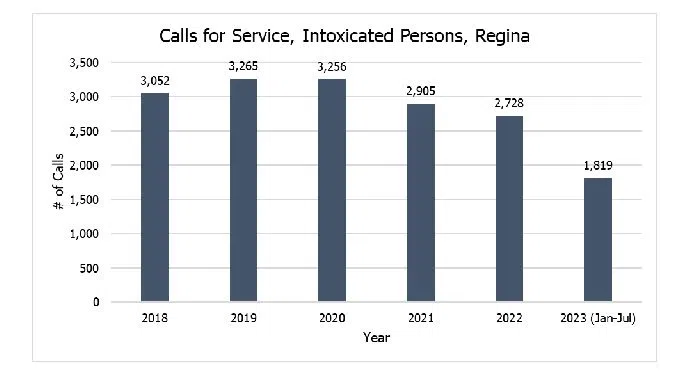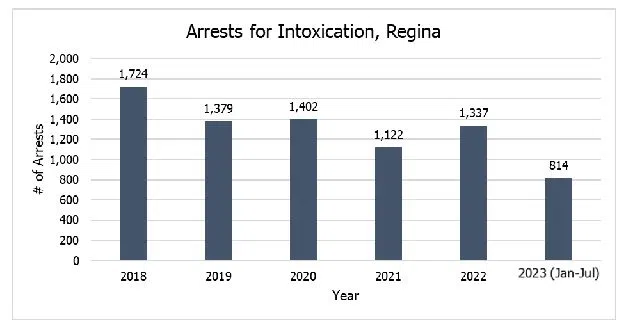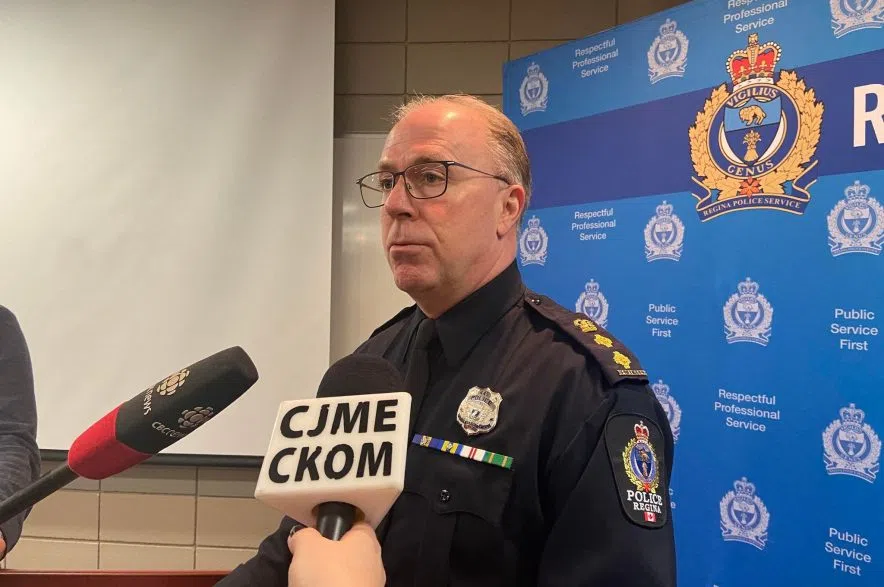The Regina Police Service (RPS) responded to almost 2,000 calls for public intoxication in the first half of 2023, according to a recent report.
At a Board of Police Commissioners meeting Tuesday, a report was presented analyzing a five-year review of public intoxication in the city.
Between Jan. 1 of this year and July 31, officers responded to 1,819 calls for service about public intoxication.
According to the report, over the 5 1/2 years included in the data, one person had been arrested 144 times for public intoxication in the city. Interim Police Chief Dean Rae said with cases like that, the RPS reaches out to Social Services or other organizations for assistance.
“We would reach out to them and explain the challenges that we’re experiencing with an individual and ask for their assistance to help us with them,” Rae explained.
The report says police officers can detain individuals who are publicly intoxicated by drugs or alcohol if they are likely to cause harm to themselves or others.
The officer then must assess if there is anyone to take care of the intoxicated person, like a friend or family member. If not, the officer will take them into custody so they can sober up. Once the person is no longer a danger to themselves or others, they are released.
These individuals are not criminally charged.
“We don’t want to criminalize individuals who have a substance use disorder. We want to take them to a place that can get them the proper supports. And in our detention, we don’t have the proper supports available for them,” Rae said.
Rae said the lack of shelter and detox spaces can cause issues.
“It’s problematic. The risk is that sometimes they have underlying health conditions, and if they go into some type of medical distress, that’s the risk to the organization. They could potentially pass away or have some severe reaction,” he said.
The RPS has paramedics available, but Rae knows it’s not enough.
READ MORE:
- Province providing $6.6 million to Regina Police Service, funding 49 positions
- New drinking guidelines can help reduce stigma, says mental health expert
According to Rae, the provincial government is opening a 15-bed secure facility sometime in the future. He said police officers will be able to take intoxicated people there and staff can provide other necessary supports.
“The support is what’s necessary for these individuals — support not just on the health side, but with their addiction issues as well. We’re very happy with 15 (beds) and we think it’ll be a great start going forward,” he said.
In an ideal situation, Rae said it would be nice if the city had a centre with a number of different services available where police could take these individuals, saying the police can only provide so much assistance.
“That’s where it’s not really a policing issue, it’s likely more a health issue. Maybe (it could be) Social Services and other ministries that would be able to tap into a multitude of different services to help those individuals out,” he said.
In conclusion, the RPS said it hopes the announcement made by the provincial government of funding for a secure, low-barrier detox space will benefit the community. It will also also improve the police service’s ability to provide better services for these types of calls.
Other findings in report
According to data collected from January 2018 to July 31 of this year, the RPS responded to 17,025 calls for service reporting public intoxication.
The highest number of calls was 3,265 in 2019. The lowest yearly total of 2,728 calls was in 2022.
Overall patterns show a reduction in service calls.
The North Central community recorded the highest number of calls at 3,943.

Statistics from a recent report done by the RPS on calls for service for intoxication. (Regina Police Service)
In terms of arrests, 7,778 were made over the data period.
The highest number of arrests of one individual was 144. Two other individuals were arrested 60 and 58 times, respectively.
The most arrests for intoxication was 1,724 in 2018. The lowest yearly total was 1,122 in 2021.
From the beginning of January to the end of July this year, there have been 814 arrests made.

Statistics from a recent report done by the RPS on arrests for intoxication. (Regina Police Service)
The full report can be seen here.







